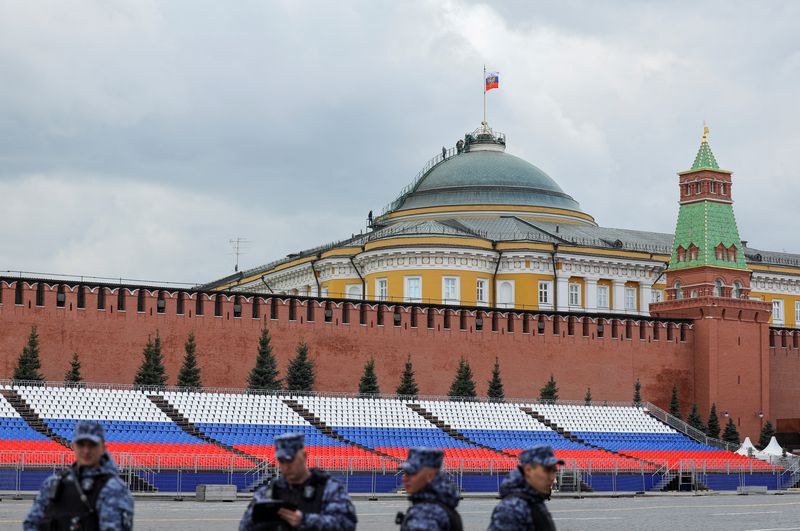MOSCOW (Reuters) -Russia will hold a presidential election on March 17, 2024 at which President Vladimir Putin is likely to run for another term that could keep him in power until at least 2030.
WHEN IS THE RUSSIAN PRESIDENTIAL ELECTION?
The election will be held on March 17, 2024 and the winner will be inaugurated in May.
The upper house of the Russian parliament voted for the date on Thursday - essentially the start of the election campaign.
Voting will also take place in what Russia calls its new territories - parts of Ukraine now controlled by Russian forces. Ukraine says it will not rest until it has ejected every last soldier from the annexed territories. Russia says the regions are now part of Russia.
HOW MANY PEOPLE CAN VOTE?
Around 110 million people have the right to vote in Russia but around 70-80 million people usually cast ballots.
Turnout in 2018 was 67.5%.
HOW LONG CAN A RUSSIAN PRESIDENT RULE?
Putin, who was handed the presidency by Boris Yeltsin on the last day of 1999, has already served as president for longer than any other Russian ruler since Josef Stalin, beating even Leonid Brezhnev's 18-year tenure.
The 1993 Russian constitution, based loosely on France's 1958 constitution, was seen by some in the West as a development that would lead to democracy in post-Soviet Russia.
It originally specified that a president could serve for two successive terms of four years.
Amendments in 2008 extended the presidential term to six years while amendments in 2020 removed the stipulation that no person could serve as president for more than two terms "in a row". The changes also banned ceding any territory.
WILL PUTIN RUN FOR PRESIDENT?
Putin has yet to say whether or not he will run, though Reuters reported last month that he had decided to. He would be assured of victory given backing from the state and its media.
After Putin was appointed as acting president by Yeltsin on the last day of 1999, he won the 2000 presidential election with 53.0% of the vote and the 2004 election with 71.3% of the vote.
In 2008, Dmitry Medvedev ran for president and Putin served as prime minister before winning 63.6% of the vote in the 2012 presidential election and 76.7% in 2018.
DEMOCRACY OR DICTATORSHIP?
The West casts Putin as a war criminal and a dictator though opinion polls show he has approval ratings of 80% - higher than before the war in Ukraine.
The Kremlin says Putin enjoys overwhelming support from the Russian people, that Russia does not want to be lectured by the West about democracy and that no politicians in the West enjoy similar levels of approval to those Putin has.
WHAT DO ELECTION MONITORS SAY?
In 2018, a OSCE Office for Democratic Institutions and Human Rights (ODIHR) mission observed the election.
"After intense efforts to promote turnout, citizens voted in significant numbers, yet restrictions on the fundamental freedoms of assembly, association and expression, as well as on candidate registration, have limited the space for political engagement and resulted in a lack of genuine competition," it said. "While candidates could generally campaign freely, the extensive and uncritical coverage of the incumbent as president in most media resulted in an uneven playing field. Overall, election day was conducted in an orderly manner despite shortcomings related to vote secrecy and transparency of
counting."
Golos, an independent vote-monitoring movement, has come under pressure from authorities over recent months.
Golos said such attacks, including the detention of its leader, were aimed at preventing public observation of the presidential election.
ARE THERE OTHER CANDIDATES?
Putin will face little real competition.
In 2018, the man who came second, Communist strawberry tycoon Pavel Grudinin, who formerly supported Putin, won under 9 million votes, or just 11.8% of the vote. Putin won over 56 million votes, according to official results.
Russia's most famous opposition politician, Alexei Navalny, is in jail so cannot run for president. Navalny has castigated Putin's Russia as a state run by thieves and criminals. He has warned the leaders of Russia will ultimately be crushed by the forces of history and burn in hell for creating a bloodbath in Ukraine.

Pro-war Russian nationalist Igor Girkin, who is in custody awaiting trial for inciting extremism, said in November that he wanted to run for president even though he understood the March election would be a "sham" with the winner already clear.
In the 2018 election, besides Putin and Grudinin, six others ran including nationalist Vladimir Zhirnovsky, who died in 2022, Ksenia Sobchak, a socialite who is the daughter of Putin's old boss in St Petersburg; and Grigory Yavlinsky, a Russian economist turned opposition politician.